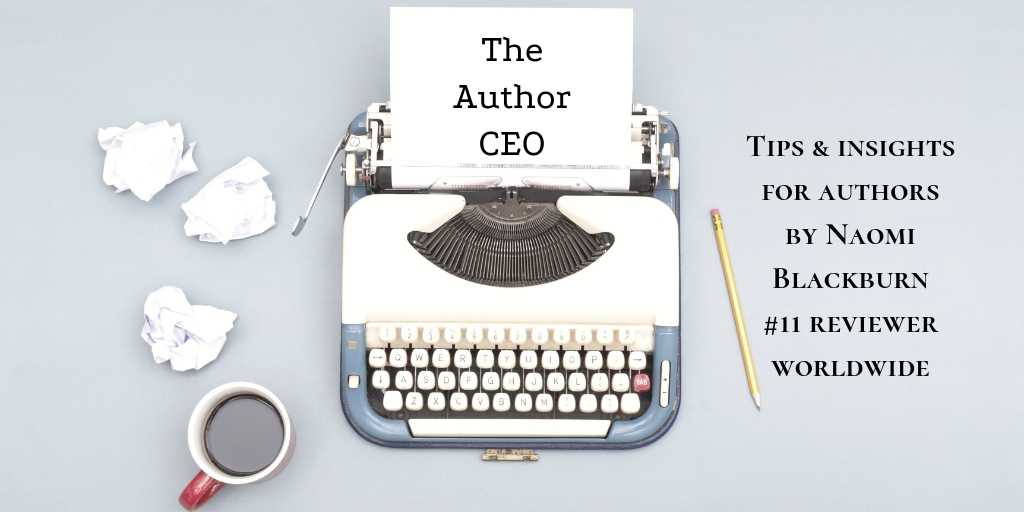This week The Author CEO Naomi Blackburn talks about the importance of vetting your reviewers. The reviewing world is full of selfless, boundlessly helpful readers and bloggers – but unfortunately there are also a few unscrupulous individuals whose reviews won’t necessarily help you or your readers.
Naomi is founder of the Goodreads group Sisterhood of the Traveling Books, as well as the Nordic Noir group, dedicated to discussing Scandinavian mysteries. This year, Goodreads ranked her at # 11 on their top reviewer list, in both the U.S. and in the world (2011 rankings). As a reviewer, Naomi is brilliant, insightful, and, as she puts it, “brutally honest.”
Please feel free to leave questions for Naomi, as well as any suggestions you may have for future posts. I hope you enjoy the column!
The Author CEO: Vet Your Reviewers
by Naomi Blackburn
Last week, while posting new reviews and following up on a few I’d previously placed on Amazon, I noticed that three authors I’d worked with had received reviews from a disreputable Amazon reviewer. Colleagues have criticized this reviewer for posting an absurdly high number of reviews, giving inflated ratings, and writing reviews that seem to have been lifted directly from book jackets. All three authors had received 5-star reviews (as do nearly all the books this reviewer rates); the ‘reviews’ consisted of multiple-paragraph synopses, with little space devoted to the reviewer’s own feelings about the book.
Unfortunately, it is not only the disrespected reviewer who’s been slammed by fellow reviewers: the authors-and their books-have also been targeted. Authors who reach out to a particular reviewer, knowing ahead of time that the review will be positive, cheat the system. Based on this assumption, books reviewed by the reviewer in question have also been targeted for critique-with reviewers, in some cases, going so far as to recommend boycotting the book as well as other books by that author.
Here is a sampling of responses to those questionable 5-star reviews (identifying details removed):
‘I love Author B’s books and would buy this one regardless of the reviews. If I was unfamiliar with this author, however, I would disregard Reviewer A’s review and wait for one from someone who had actually read the book and used phrases such as ‘I liked…’, ‘I did not like…’, ‘This book made me feel…’ (you get the picture).’
‘Somebody, anybody, if you read this book please write a real review for it!
Thanks. Sounds like it might be a good one but this review (the only one so far) doesn’t help.’
It is never a good thing when comments focus on a review rather than on your book! When this happens, your book becomes irrelevant-before it has even had the opportunity to take off.
Before submitting your book for review, it is imperative to look at the reputation of the reviewer.

In previous posts, I have discussed how to find reviewers and linked to resources from Christine Nolfi for developing a data base, but that is only the first step. It is imperative to vet your reviewers, as well.
So, how do you vet a reviewer?
1) Identify where they review. Do they have a book blog? Or do they review only on a vendor site, such as Amazon or Barnes and Noble?
2) Look at their reviews, particularly on vendor sites. How are they received? Is the reviewer and/or his or her reviews respected or attacked by fellow reviewers?
3) Do their reviews give concrete reasons for why they liked or disliked the book? Or are the reviews just expanded jacket information with little attention to their impressions of the book?
4) Do all or a majority of books they review receive 4 or 5 stars? How many reviews has the reviewer done? Do they limit reviewing opportunities to only books of interest to them? If so, they might have only 4 or 5 star reviews, but they only review books that are of interest to that potential reviewer. This is normally pretty evident in assessing their reviewing history. On a final note, remember: 1, 2, and 3 stars are fine, as long as the reviews are written in a constructive manner.
5) Ask fellow authors what their experience has been in working with reviewers. Don’t be afraid to ask for advice. This is yet another reason not to ‘burn bridges’ with fellow authors!
6) Ask the opinion of established book bloggers you have worked with. Most book bloggers talk to one another. Believe it or not, like authors, we have a good idea of the reputation of certain book reviewers, as we talk about it too!
It might take extra time to vet reviewers, but it will save you a serious headache. And think of the money you’ll save by not sending ARCs to reviewers whose review might cost you instead of benefitting you!
How do you vet reviewers?
About Naomi Blackburn
Naomi Blackburn, owner of The Author CEO, a consultation firm dedicated to helping independent authors navigate the development of strategic business plans and the marketing world, holds an MBA and has worked in the field of business development, sales and consulting for 12 years. A former social worker, she has helped hundreds of clients meet their life goals. An avid reader and top Goodreads reviewer, she comes to the world of books from a reader/reviewer’s perspective. She strives to help authors achieve their goals by teaching them to think of themselves as CEO/entrepreneur of a small business and helping them negotiate the business side of selling books.




[…] choose reviewers. Check out this guest post by Naomi Blackburn, a very prominent reviewer, on Terri G. Long’s blog. I am presently […]
Naomi: another great post. I have been spending a lot of time finding and writing to reviewers to get my book reviewed, but I had never considered "vetting" the reviewers. Thanks for the insight. The whole review process has gotten more complicated, and both readers and authors need to be more careful of reviews. Thanks for sharing with us. And you, too, Terri, for hosting the site. Very informative for both readers and writers.
Good post. A reviewer who is unreasonably gushy is like your mom cheering at the spelling bee. We see someone's happy for you but it doesn't change your score.
As usual, thanks for a great comment, Jim. I think the comparison could be made to reviewers look at books to see the "reputation" of the author. How have they responded to reviews both, positive and negative, previously? What is the "feel" of the book from previous reviewers? I could go on. It is simply looking at who you are choosing to review your books with a critical eye as to their reputation among other reviewers.
I can tell you when I saw the criticism that these authors were receiving when they didn't know the reputation of the reviewer, one was actually was referred to a certain reviewer by another author, it broke my heart.
Hi Naomi,
Great post as usual :) My question is regarding unsolicited reviews.
What happens if a book is reviewed by someone who writes a review such as the one you described but the review was totally unsolicited? How can the author be slammed for that when he is not responsible for soliciting such positive reviews? And when that happens, is there something we can do to avoid a backlash?
Thank you in advance for your insight.
Chris
Thanks, Chris…
Fancy seeing you here! ;)
My advice to authors is NEVER respond to negative reviews. It is tough…I know it is tough. I like to say the review is the opinion of the reviewer UNTIL the author responds. I have seen situations where it has turned and become a backlash towards the author when it appeared the author went in pretty innocently. In other words…keep yourself out of the middle of it. The situation above is between reviewers and this small group of “disrespected” reviewers. The second you respond, you put yourself in the middle of that battle. It isn’t worth it.
What you can do is to submit your book to reviewers to counteract the negative reviews and garner as many reviews for your book as possible. Again, ask questions from reviewers or authors who you have developed acquaintances with and ask what they know about certain reviewers or if they know certain reviewers who you can ask to review your book.
Like in all businesses, it is about networking and looking at your competition as a support versus an adversary.
Hi Naomi :)
The no replying should have become a #1 rule in any author’s list by now. The reality is that reviews are not praises but buyers’ guidance. It’s not meant to rub a writer’s ego but to inform those looking to buy a product. If the guidance provided is not useful to those looking for advice on whether or not to buy that item, be it a book or a car or electronics, then it has no value to either side.
As for the looking for counteracting those reviews, is there a group (aside from the STB) or organization of reviewers that would list reputable review sites so writers don’t submit to sites or to reviewers who are known to give skewed reviews?
Honestly, as a new player in the field, it’s close to impossible to define who plays by the rules and who doesn’t. When you first publish a book, the biggest hope and hardest achievement is to garner that dreamed good review (independent of stars). Not as ego boost but as validation. Because of the enormous competition, submitting to big name sites has a 1% chance of success (if not less).
So we are left floundering in a vast sea where you have no idea who’s the shark, who’s the dolphin and who is the dead fish.
The same way that indies are now gathering forces and having independent publishers’ seals of approval to guarantee the quality of the product and raise the bar for indies, Wouldn’t it be fantastic having an organization for reviewers where they could analyze a reviewer’s reporting of books and list that person as a certified reviewer?
A list like that would benefit both sides. The readers first and foremost because they would get quality reviews and guidance, and writers because we wouldn’t fall into the pit of submitting to everybody under the sun just for the hope of receiving a good review.
Am I too far off here?
Thanks for posting this on the site, Chris. I thought in your email, that you had asked some great questions. Here is my response to Chris’ email.
Unfortunately, as you know…it hasn’t and writers continue to shoot themselves in their feet.
I don’t know of any other group, but I am not that deeply involved in it.
The only comparison I give to Indie writing is restaurants. There are an overabundance of bars/restaurants and that is why so many fail. It is not only the quality, but also the marketing/word of mouth that gets the word out there about what makes a restaurant rockin’. One of my favorite new sayings is by a guy by the name of Jon Taffer who does bar turnarounds. He has a show on Spike TV called Bar rescue that I love. Any way, he made a comment to this jackass of a bar owner who felt that he was in competition with every other bar owner in his area and Taffer told him ” “It is about cross marketing & being part of the community!There is enough to go around!” Once this bar owner was able to address this within himself, he was much more successful. You have to use your gut instinct to determine who is there and who isn’t.